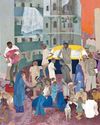
I was walking to my home in Toronto when a well-dressed man politely stopped me to ask for directions.
"Could you tell me which way to Bloor and..." He struggled to get the next word out, a pained look on his face, but I knew better than to finish his sentence for him.
"... Bathurst?" he said after several seconds of straining. When I started to answer, he told me that he didn't actually need to know. He was practising stuttering openly, he explained, hoping to become more confident doing so around strangers.
I lit up with excitement. "Are you doing that because it's National Stuttering Awareness Day?" I asked, always eager to connect with other people who stutter. When the man asked how I knew that, I said that I grew up with a stutter.
He nodded, looking a bit wistful: "And I suppose your stutter has magically disappeared since then?"
His question gave me pause. I understood why he assumed this-when compared to his fairly severe stutter, I sounded fluent, stutter-free. But even as we spoke, my stutter had influenced my speech: For example, I'd misnamed International Stuttering Awareness Day as National Stuttering Awareness Day to avoid the tricky front vowel sound at the beginning of the word-a sound I continue to struggle with.
And while it's true that my stutter was more noticeable when I was a child, this was partially because I'd since found workarounds for difficult words and sounds, helping me hide the worst of it.
When I answered his question, I opted for the simplest explanation: that I had grown out of my stutter. But was this true?
This story is from the {{IssueName}} edition of {{MagazineName}}.
Start your 7-day Magzter GOLD free trial to access thousands of curated premium stories, and 9,000+ magazines and newspapers.
Already a subscriber ? Sign In
This story is from the {{IssueName}} edition of {{MagazineName}}.
Start your 7-day Magzter GOLD free trial to access thousands of curated premium stories, and 9,000+ magazines and newspapers.
Already a subscriber? Sign In

BOOKS
Books review

STUDIO - Off Lamington Road by Gieve Patel
Oil on Canvas, 54 x 88 in

NEWS FROM THE WORLD OF MEDICINE
FOODS THAT FIGHT DEMENTIA

TO HELL AND BACK
The Darvaza crater in Turkmenistan is known as the Gates of Hell. I stood on its edge - and lived to tell the tale

THE SNAKE CHARMERS
Invasive Burmese pythons are squeezing the life out of Florida's vast Everglades. An unlikely sisterhood is taking them on

Sisterhood to Last a Lifetime
These college pals teach a master class in how to maintain a friendship for 50-plus years

...TO DIE ON A HOCKEY RINK
ONE MINUTE I WAS PLAYING IN MY BEER LEAGUE, THE NEXT I WAS IN THE HOSPITAL

Just Sit Tight
Broken, battered and trapped in a ravine for days, I desperate driver wonders, \"Will anyone find me?\"

Allow Me to Mansplain...
If there's one thing we know, it's this: We're a nation of know-it-alls

THE BITTER TRUTH ABOUT SUGAR (AND SUGAR SUBSTITUTES!)
It's no secret that we have a serious addiction. Here's how to cut back on the sweet stuff, once and for all.